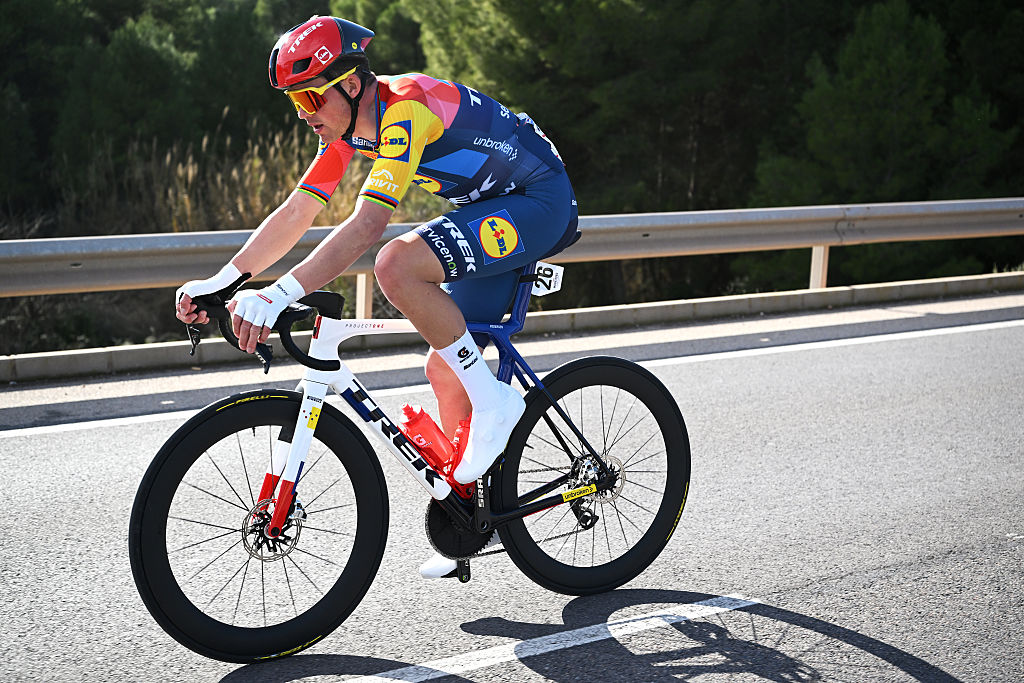Pound: "Verbruggen was the leak"
By Hedwig Kröner The Chairman of the World Anti-Doping Agency (WADA), Dick Pound, has told reporters...
The latest race content, interviews, features, reviews and expert buying guides, direct to your inbox!
You are now subscribed
Your newsletter sign-up was successful
By Hedwig Kröner
The Chairman of the World Anti-Doping Agency (WADA), Dick Pound, has told reporters in a telephone press conference on Thursday that it was UCI president Hein Verbruggen himself who leaked the doping control protocols of the 1999 Tour de France to French sports paper L'Equipe, which in turn provided the basis for the allegations that Lance Armstrong took EPO for the first of his Tour victories.
"It certainly wasn't WADA," Pound replied when asked who provided the official forms to L'Equipe. "And it certainly wasn't the French laboratory. Neither of us had that information.
"It's quite clear. Mr. Verbruggen told us that he showed all six of Armstrong's doping control forms to the journalist of L'Equipe and that he gave them a copy of at least one of the forms. As I understand it, one of the forms goes to the UCI, one to the athlete, and another one to the National Federation, one went to the French Ministry [of Sport]. The French Ministry destroyed its copies, I think, two years later. I have no idea whether the French Federation have them or if so, where, but the UCI has kept them. I don't know whether they have kept their own requirement to destroy the forms two years later but they obviously haven't."
Interestingly, the forms reproduced on the L'Equipe headlines of August 23 show the mention "Feuillet 1" (literally Sheet 1). Cyclingnews understands that the first sheet of the protocols always goes to the UCI.
So it was really Verbruggen himself who gave the documents to the L'Equipe journalist? "That's what I understand from the letter that he [Verbruggen] sent to us," Pound replied, adding he didn't know whether Verbruggen knew of the purpose the information would serve. "They certainly knew who [the journalist] was. But I certainly don't know how it was that the UCI would have made available those forms with the code numbers on them. If they were worried about confidentiality and so forth, you would have thought that would be a fairly routine and precautionary step."
Asked if he would be willing to publish the letter, Pound, replied, "If the investigation is thorough and the report is clear, then the exchange of correspondence doesn't mean too much. But if it's not a complete report and we have to comment on it, then the correspondence would probably be quite relevant."
The latest race content, interviews, features, reviews and expert buying guides, direct to your inbox!
Pound also said that WADA was concerned about the way in which the UCI conducted its investigation of the affair. "We're working with the UCI and we're willing to continue to work with them as long as we are convinced that they're going to do a full and complete investigation on this," he continued. "But if it's simply a matter of them looking for some kind of a scapegoat, then that, to us, is not an investigation."
Pound's allegations are quite surprising, given that Verbruggen himself has been calling for the head of whoever it was that leaked the information to L'Equipe. In light of next week's UCI presidential elections, it doesn't look good for the current president. But in its defence, the UCI told AFP that L'Equipe journalist [Damien Ressiot] "came to the UCI on a false pretext and with the approval of Armstrong. He left the UCI with a copy of just one document."
EPO is not created in frozen urine
Dick Pound also rejected any doubts concerning the age of the tested samples. "If you find EPO in a frozen urine sample, it means that it's been there since the beginning. There might be certain substances that even if the urine is frozen for a number of years that might disappear, but there aren't substances that appear. So if it's there it was there all along."
Finally, Pound didn't rule out that retrospective testing could one day serve in a disciplinary manner. "Within the Anti-Doping Code, we now have a provision that allows us to go back eight years on retesting samples, whether they have been taken in our out of competition. What we have to make sure now is the appropriate legal rule. So that if we do find something in what would then be the B sample, that we have the ability to impose a sanction. But you have to provide the athlete with some means of assuring that it's been properly done - either be keeping enough of the B sample to allow for retesting, or by checking the DNA markers of the urine or blood for identification. We're going to work on that because it is a feature that will become increasingly important."
As far as Cyclingnews understands, the 1999 B samples still provide enough material for yet another test.
Cyclingnews coverage of the L'Equipe allegations
June 27, 2006 - Carmichael defends Armstrong, Armstrong answers L'Equipe & LeMond
June 26, 2006 - LeMond: "Armstrong threatened my life"
June 19, 2006 - Armstrong calls for Pound's exit
June 18, 2006 - Lance Armstrong's open letter against Dick Pound
June 4, 2006 - UCI hits back at WADA
June 3, 2006 - WADA slams the Vrijman report
June 2, 2006 - L'Equipe stands by its story, UCI supports Vrijman's findings
June 1, 2006 - UCI, WADA and Armstrong react to Vrijman's report
May 31, 2006 - UCI lawyer asks for Armstrong's name to be cleared
May 14, 2006 - Two more weeks for Armstrong investigation
Click here for full coverage of the L'Equipe allegations.
